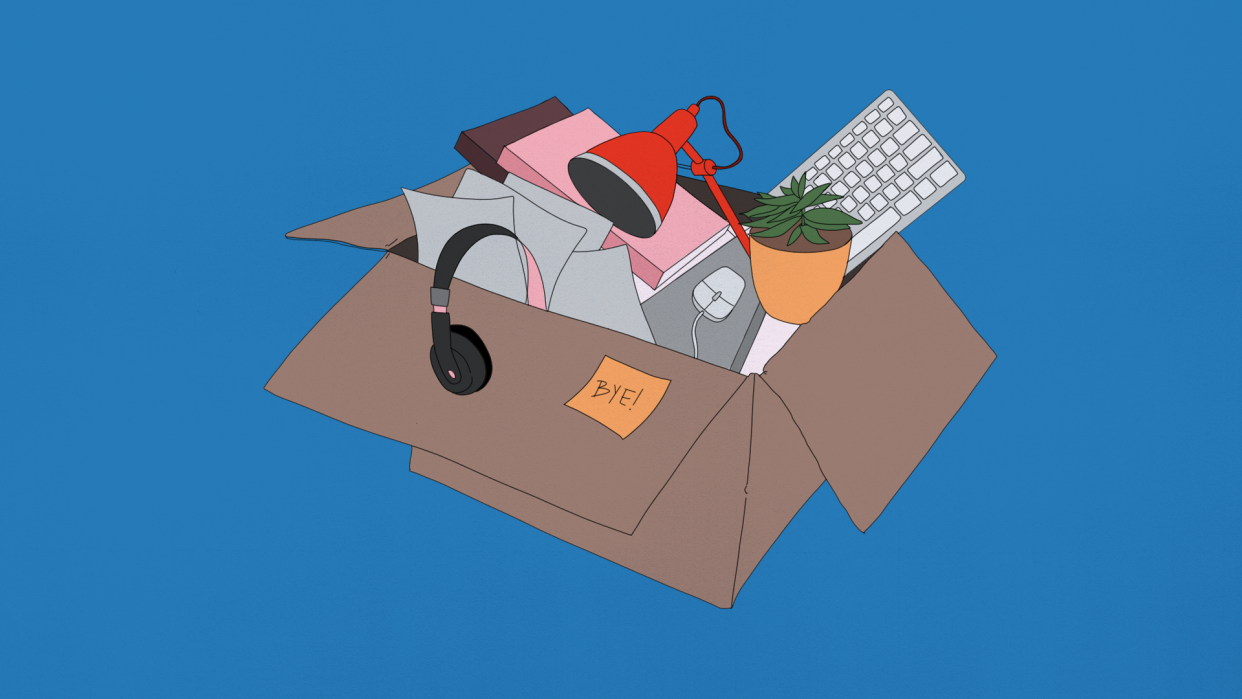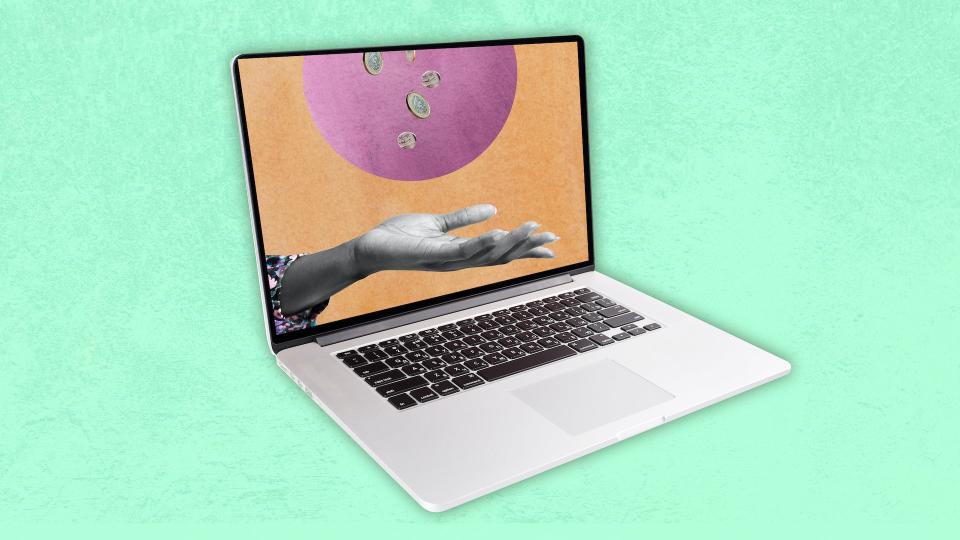How to Quit a Job Without Losing Your References (or Your Dignity)

Channing Smith
The below guide that explains how to quit a job—and quit it well—is part of Glamour's 2024 Smart Goals series, which explores reasonable, quantifiable, and—crucially—sane ways to embark on self improvement objectives you'd like to complete this year. We all know traditional New Year's resolutions are nonsense and are mostly designed to make us feel terrible about ourselves and, as such, spend money on things we think we need to live a more fulfilling life. Here, we dig into how anyone can quit a job without fear if they're feeling stuck, while also providing some tactical advice on how to know if it's really the right time to give your two weeks.
Figuring out how to quit a job is, honestly, harder than it should be. Ideally, we'd all be able to walk into our manager's office, respectfully give our notice, and move on without any anxiety, dread, or fear of burning what (maybe) are valuable bridges we've built by virtue of being a good employee. But the fact is, when we know in our gut it's time to quit—whether because the job isn't serving us anymore, we feel like the environment is toxic to our mental health, we've simply outgrown the role, or just want to try something new—we tend to put off the inevitable and instead stress about what to say, how to say it, and whether your colleagues will be mad at us (ah, to be a woman.)
The important thing to remember is that the decision is entirely yours, and it likely is for a good reason.
“Quitting your job can be exciting, stressful, and overwhelming all at the same time,” says Christian Lovell, Founder of Careers by Chris and Career Educator. “It’s important to keep a positive mindset throughout the process, reminding yourself of why you are quitting in the first place. Remember that choosing to leave isn't a sign of failure, but instead, a thoughtful step toward prioritizing your well-being and greater career goals.”
Whether you’ve found another role that aligns better with your priorities at the moment or you just want to say “eff it” and leave the role behind without the next thing lined up, it’s important to know the right way to quit a job. Here, how to resign the right way that will benefit your present and future self.
First, assess your finances.
“When you think it’s time to leave your job, one of the first questions you should be asking yourself is if you’re financially prepared,” says Nicole James, Chief People Officer at Credit Karma. This sounds obvious, but it the point cannot be stressed enough for those of us who feel okay about quitting without another job lined up. “To best understand the full financial benefits of your job, you’ll need to look at your total compensation—things like health benefits, retirement plans, stock options, and more. Your job may be more than just a paycheck you get every two weeks.”
So ask yourself—just how long can you provide for yourself, realistically, without a job? “You may find that quitting right away may put you into debt, and it’s best to wait a bit until you have more saved,” explains James. If you’re taking a pay cut in your next role, the same question applies. If that’s the case, she says, “You’ll need to make some adjustments to your spending and savings habits to stay on track financially.”
The New Money Rules
Without the power of physical energy—which you can often shift in your favor—asking for more via screen is a new frontier that requires its own specific set of skills.
While I can practically hear some of you screaming “I have enough! Just get me out!” some of you might not be so sure. It can be scary to take the leap, even with emergency savings and your mental health dwindling. “One thing I like to tell clients is that if they have a good amount of money saved, they are probably really good stewards of money, and that's not going to change when their job changes,” says Roshida Dowe, Career Break Coach. She notes that while doing the math for expenses is needed, once the job is gone, your money needs may change in unexpected ways. “Many working women spend tons of money on self-care, shopping, and happy hours to make themselves feel better about going into a job they despise. When the job goes away, those coping mechanisms (and spending) can go away too.”
Know that getting a new job may take longer than you think.
A key thing to consider when quitting without a job lined up is that often job seekers take “longer than anticipated” to land their next role, says Lovell. So while you absolutely can leave a job without a backup plan, maybe put away one more month of expenses or pick up a small side gig that can help you through this transition when you’re finally ready to seek out another role.
“Finding a job is stressful enough without the added pressure of not being able to pay bills,” says Lovell. “Having a financial cushion allows you the freedom and flexibility to choose a role that aligns with your goals, instead of taking the first available offer because you need the money.”
Consider other job-leave options first.
Before you full-out quit, take a minute to assess the why. If you once loved your job and now can’t stand it, ask yourself: did the responsibilities of the job itself change or did you? Are you burnt out, dealing with other life issues, or is something else impeding your ability to balance the work? If so, Dowe encourages you to read your employee manual once more and see if a career break, sabbatical, or time off policies would allow you to take extended time off before making the bigger decision to fully quit. If not, you can always ask.
“If a sabbatical is approved, take the time off if the strings attached are things you can live with," she advises. "A months-long break will put you in a completely different mindset, and you'll start making decisions from a different place.”
You can also work with a medical professional—i.e. therapist, psychologist, or your general practitioner—to understand if your current health state qualifies for a covered medical leave (this will require you to read your employee manual, too). Anxiety and other mental health conditions can fall under the Family and Medical Leave Act (FMLA). While most times a medical leave is unpaid, you’re guaranteed certain benefit protections, including continued healthcare coverage.
Quitting isn’t a career killer—even if you’re still figuring it out.
“One of the biggest myths and misconceptions I work to dispel on my platform is that quitting a job is a risky move for your career,” says Lovell. “The workforce is changing and the idea that quitting your job is a career-killing move overlooks the potential for growth that strategic career transitions can bring, both in increasing your salary and skillset.”
If you're feeling okay about your finances, not moving on to a better-paying job—or a job at all for as long as you can reasonably swing it—is okay too. Think of it as a small step back rather than a setback. “Too many people stay in jobs they hate for stability, but it's a lose-lose proposition,” says Dowe. “Often, those people are too tired or stressed to search for another job, and when they do get an interview, they're not showing up at their best. So they're stuck in a never-ending loop." That’s why, she says, “Taking time off to clear your head, center yourself, and decide what you really want can be the best thing you can do for yourself.”
Shape your exit plan—and take advantage of your benefits.
Once you’re sure you want to quit, the playbook starts taking shape. Check on all your benefits and determine how long you’ll have access to them once you resign. Then, set up everything you can take advantage of right now—healthcare appointments, free financial planning appointments you have through your 401K plan, upping your 401K contributions for the largest possible match, wellness benefits, etc. (Which, to anyone reading this: You should absolutely be using your benefits all the time. They are part of your total compensation.)
“I always recommend that my clients read their employee handbook so they have a good understanding of their benefits, and what they might be leaving behind when they leave their job,” says Dowe. “Those benefits are yours and you shouldn't feel bad about taking advantage of them. With my last job, I had six months notice that they were going out of business and laying everyone off. In that time, I had my eggs frozen. I wasn't sure that I ever wanted children, but I was 38 and the company paid for the whole procedure, so it felt like an opportunity I might never have again.”
While you’re at it, take advantage of perks that may help you after this job and as you prepare for another—whether that’s through your employer or another service provider. “One tip I like to tell job seekers is to check with their financial institution to see if they provide support,” says Lovell. “For example, SoFi, a personal finance company, provides its members complimentary one-on-one career coaching and career services."
Also, have a plan for what you’re going to take with you—most likely, this will be a retirement account, and things like an HSA (Health Savings Account). “Will you leave them with your current provider? Will you roll them over? These decisions will make your financial transition less stressful and will ensure you have a plan for the future,” says James.
Money Smarts
To ask for a raise, first know your value. Then review these expert tips.
Be gracious, but stand firm in your decision.
Quitting can be both nerve-racking and adrenaline boosting. For those with people-pleasing tendencies, it can also feel like you’re letting your team or boss down. You can’t be worried if they’re going to be sad, or worse, angry with you—and by being as gracious as possible, you’ll set yourself up for success. “It’s best to handle your resignation with as much professionalism as possible,” says Lovell.
“Remember to give two-weeks notice, if possible, and express gratitude for the opportunities. I always encourage professionals that offering to assist with the transition can go a long way in maintaining your professional relationships.” Lovell says that this includes closing out projects, ensuring a smooth handover of responsibilities, completing pending tasks, and leaving detailed documentation of what you were working on and processes for your boss and the next person who takes your role.
If you’re worried the next person to enter this role will be doomed, the best thing to do is provide honest but constructive feedback in the exit interview you should always get. Honesty doesn’t have to be brutal, and your delivery will help raise flags for the company to make sure their next hire stays—which is a win for everyone.
Scared of burning bridges? “Remember that when you're giving feedback, you're giving it to a person," says Dowe. “If someone is the type who takes things personally, you may not be able to prevent burning that bridge. Another thing to consider is, if your honest feedback would burn a bridge, do you even want to cross that bridge again?” Lovell emphasizes that it’s “impossible to guarantee that you will not burn bridges when quitting your job, even if you do everything right.”
By all means, try to take some time off.
Often, people start their next role immediately after their two-weeks notice is up, or hop on LinkedIn the day after quitting to start job seeking. But this is the time to take a pause, a breath, and really figure out your priorities, wants, and needs of a new job, along with taking the time to really rest if you can afford to. “This is a rare opportunity to explore what you would do if you didn't have your usual constraints,” says Dowe. “Find the joy in that freedom.” Always negotiate your start date if you have a job lined up, and if you don’t, take at least a few days off to reset your brain, rest, and create space to truly think about what you want next.
Samantha Leal is a freelance writer and editor whose work has appeared in Well+Good, Marie Claire, Latina, The Knot, and Refinery29.
More Smart Goals:
How to Quit Smoking
How to Start a Podcast
How to Start Going to the Gym
How to Start the Divorce Process
How to Quit Drinking
How to Start a Book
Originally Appeared on Glamour



